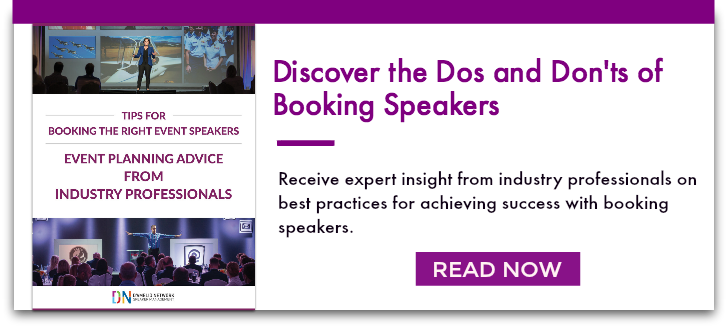Corporate Event Planners FAQ: How the Speaking Industry Works
As anyone who has been booking speakers for events can readily attest, the speaking industry can be one very confusing space to navigate to the outsider. Those of us on the inside are used to it, but if you only step into this world a few times a year, making sense of how things work can be a daunting prospect.
As someone who’s been involved in bringing talent and audiences together for my entire career, I thought I’d offer up a few essential insights that would be useful to corporate event planners - both novice and veterans alike.
But first – a disclaimer: having spent 42 years in the agent world, 27 of them with Washington Speakers Bureau, I no longer occupy that seat. Needless to say, in that time I’ve accumulated a fair amount of experience in seeing the changes the industry has gone through. My new role is as manager of ten speakers who appeal to business audiences. My company does work with the full range of resources I describe here: bureaus, brokers, and other event planning resource firms that serve speaker buyers. I have nothing to gain here; the only intent is to shed some light on what corporate event planners have told me was confusing about the speaking industry during my former days as an agent.
SPEAKER RESOURCES
START AT THE BEGINNING – WHAT’S A SPEAKERS BUREAU?
Let’s start with the basics. Most event planners secure their top outside speakers through a bureau or broker. Fundamentally, that entity is responsible for documenting the details with a contract and making sure the speaker has what they need (in the way of technical requirements, background information, etc.) to do a good job at the event. For bigger name speakers the responsibilities get more complex. Fees for the bureau or broker are built into the speaker’s fee you pay.
Some bureaus only handle speakers they represent exclusively. Other bureaus work with speakers on a non-exclusive basis. Then there are bureaus that are hybrids: they handle both exclusive and non-exclusive speakers.
IS ONE CHOICE BETTER THAN THE OTHERS?
Well, when you are working with the exclusive representative you are working with people who arguably know the speaker better than anyone. So certainly that’s an advantage. A devil’s advocate would say that the trade-off is a potential lack of choice; that exclusive-only bureaus aren’t able to fully meet the needs of event planners.
Bureaus that represent either all non-exclusive or a hybrid model of exclusive and non-exclusive speakers present themselves as offering more choice. And in the case of all non-exclusive operations, they suggest they’re more objective in terms of their recommendations; implying they consider the speaker buyer’s needs most of all – and don’t have to worry about recommending exclusives first in order to keep them busy.
AM I BETTER OFF TRYING TO FIND SPEAKERS ON MY OWN?
Certainly, it's possible to spend time researching non-exclusive speakers and booking them directly on your own. Most people, though, are too busy for that. And people want the insurance and safety of having an organization that's got their back. In the event something happens with travel, speaker illness, etc. - it's comforting to have a pro ready to spring into action on your behalf. In almost all instances, it's not going to cost you any more.
So, as you can see, this decision really is a matter of choice.
WHAT OTHER SPEAKER RESOURCES ARE THERE?
PR firms, advertising agencies, event planning firms, event production companies, and others can also act as resources for speakers, though most of the time they will be sourcing speakers from bureaus, agencies, and brokers. These groups can be compensated for their services in any number of ways, which I’ve described below.
Learn about the speaking industry with expert insight from
industry professionals in our eBook,
"Tips for Booking the Right Event Speakers".
UNDERSTANDING EXCLUSIVITY
WHAT DOES EXCLUSIVITY MEAN?
Many speakers align with a single bureau for representation because it makes life easier for them. That bureau becomes the conduit for all speaking activity. Usually (but not always), the exclusive bureau is also the only one that can advertise the speaker and have them on their website.
CAN YOU ONLY BOOK AN EXCLUSIVE SPEAKER THROUGH THEIR EXCLUSIVE AGENCY?
Even though the exclusive bureau might be the only one with permission to promote the exclusive speaker, they will most always work collaboratively with event production companies, PR companies, ad agencies, etc. to meet the speaker needs of their event planning clients. In many (but not all) cases, bureaus with exclusive speakers will also cooperate with other bureaus and brokers to book events; an action that’s called co-brokering.
HOW DOES THAT WORK, FINANCIALLY?
When an exclusive bureau co-brokers their exclusive speaker with another bureau or broker, sometimes the commission is split, which results in no additional cost to the sponsoring organization. In some cases the exclusive bureau will not split commission and the co-brokering bureau/broker must add a fee on top to cover their coordination efforts.
The financial situation varies when other third party resources work with the exclusive speakers bureau. How these groups are compensated for their services can vary: they can do it as part of their scope of services under their overall contract for the event; they can receive a portion of the commission from the bureau, or they can add a coordination fee on top of the speaker fee. Generally speaking these resources are transparent about the means of compensation.
NON-EXCLUSIVE SPEAKERS
WHY DO SOME SPEAKERS APPEAR ON MORE THAN ONE WEB SITE?
There is a whole world of speakers who are not exclusive with any bureau. For the sake of a better term, they free-lance and work with many bureaus, brokers, and other resources. Some of these speakers have a set gross fee and pay a commission to the booking entity. Some entities who work with clients on a flat consulting fee won’t take the commission. Other speakers work on a net fee, which means the booking entity would add their service fee on top for coordinating all the details.
WILL THE FEES BE THE SAME FOR SPEAKERS THAT APPEAR ON MORE THAN ONE WEBSITE?
Most often, but not 100%. Many non-exclusive speakers dictate what the fee is going to be so it is consistent across all bureaus and sources. But there are some speakers who work on a net-fee basis – and for those, the bureau would be adding their coordination fee on top of that.
The brokers who don’t handle any exclusives present themselves as unbiased and totally customer-focused. They say they don’t have any agenda to keep this or that speaker busy – they operate purely on the basis of what’s best for the event.
Some ONLY handle exclusive speakers
Some only exclusives AND non-exclusives
While bureaus with lots of exclusives certainly have an obligation to keep their speaking clients busy, there’s no getting around the fact that the only way to build business is to make certain the best interests of the customer are served. So while they might recommend their exclusives first, they don’t focus on them exclusively (no pun intended).
SUPPLEMENTAL READING:
Event planner career choices: Could you be a speakers' bureau agent?
and Don’t Sabotage your Event Part 1
WHAT ARE SPEAKER MANAGERS?
Speaker managers, like my firm D'Amelio Network, generally handle far fewer speakers than bureaus and brokers – it could be anywhere from one to 20. A manager’s focus is on being an advocate for the talent they manage. In that sense they’re like an exclusive bureau. The manager’s job is to know the speaker really deeply and promote him or her as widely as possible to the marketplace. Most often the manager works closely and partners with bureaus, brokers, and other resources to bring the speakers they manage to the widest possible audience. Speakers with management also generally appear on the websites of many different bureaus and brokers. Managers work to maintain fee integrity so the fee of managed speakers will almost certainly (but not 100%) be uniform no matter where you go.
WHICH SPEAKER RESOURCE IS BEST FOR ME?
That’s the easiest question to answer. Just as in making any other purchase decision in life, work with the resource you trust the most; the one you feel most comfortable with. You will find that expertise can vary from resource to resource – ultimately, you want to work with someone who understands you, your audience, your objectives for the meeting, etc. Finding someone with those qualities is an invaluable partner in your event’s success.
FOR MORE GREAT BLOGS ON SPEAKERS AND THE MEETINGS INDUSTRY CLICK HERE.
About Tony D'Amelio
Tony has spent his career putting talented people and audiences together, first in the music business and later representing the world's leading speakers. After concluding 27 years as Executive Vice President of the Washington Speakers Bureau, Tony launched D'Amelio Network, a boutique firm that manages the speaking activities of a select group of experts on business, management, politics and current events. Clients include: Mike Abrashoff, Mariana Atencio, Chris Barton, Lisa Bodell, Geoff Colvin, Daryl Davis, Suneel Gupta, Ron Insana, Katty Kay, Polly LaBarre, Nicole Malachowski, Ken Schmidt, and Bob Woodward.

.png)

.jpg)


